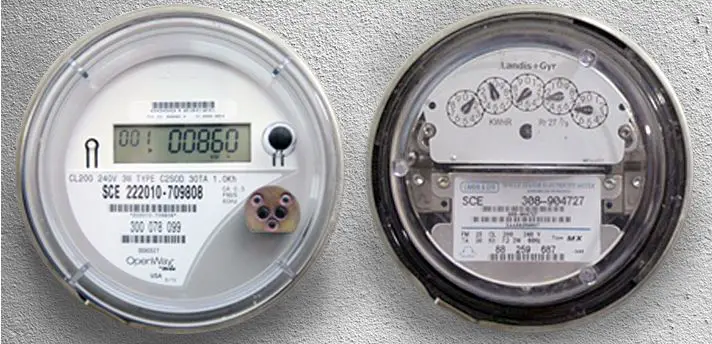Smart Meters are Spying on Homeowners-Fiction!
Summary of eRumor:
Warnings about smart meters, the devices used by electric companies to measure household electrical use, have gone viral in the Internet.
Are the electric companies spying in our homes with smart meters and are they harmful?
Some warnings suggest calling the electric company and demanding that they replace these new meters with the old ones because they are vulnerable to hackers who intercept personal data through them.
The Truth:
This is eRumor sounds like a conspiracy theory but there is little need for concern of loss of personal information or health.

Smart meter on the left next to the old style electric meter
A Southern California Edison employee told TruthOrFiction.com that smart meters do have radio transmitters to send encrypted data to the electric company.
According to the a Frequently Asked Questions page on the Amateur Radio Relay League (ARRL) smart meters operate typically at a frequency in the 902 MHz and 2.4 GHz bands. The radio transmitter range is intended to be localized with output power of 1 watt or less. The radio transmission is brief and not a signal that is sent throughout the day. Once a smart meter is activated remotely by radio signal it then transmits data to a neighborhood concentrator, which are usually mounted on power poles. That information is then relayed to the power company. By these guidelines, a smart meter is not going to tell the power company when someone is using an electric toothbrush or watching television.
Homeowners may be able to opt out and request their old meters back. According to the Southern California Edison website there is an option to opt out of the smart meter program but it costs an additional $10 per month and there is also a one time $75 set up charge. Those interested in opting out may contact their power companies for details.
Are the transmissions from smart meters harmful?
Smart meters, according to the ARRL, abide by and are protected by the Code of Federal Regulations, Title 47, Part 15, and are enforced by the Federal Communications Commission. This regulation governs the operation of other radio devices, which are common household and personal items such as wireless networks, blue tooth accessories, automotive alarm and door remote controls, cordless phones, wireless computer peripherals and portable fm transmitters for personal MP3 players. The power output of these devices is intended to be low so as not to cause interference with other devices. Low power transmissions at their designated frequencies are harmless.
Posted 02/08/14
